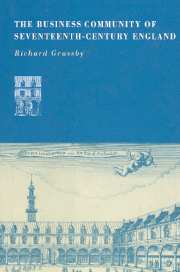Book contents
- Frontmatter
- Contents
- List of figures
- List of tables
- Preface
- List of abbreviations
- Explanatory notes
- Introduction: Questions and sources
- Part 1 Business as a career
- Part 2 Paths to fortune
- Part 3 Life styles
- 9 Religion and ethics
- 10 Family structure
- 11 Consumption and leisure
- 12 A symbiotic culture
- Conclusion: Private enterprise in a pre-industrial economy
- Bibliography
- Index
11 - Consumption and leisure
Published online by Cambridge University Press: 02 December 2009
- Frontmatter
- Contents
- List of figures
- List of tables
- Preface
- List of abbreviations
- Explanatory notes
- Introduction: Questions and sources
- Part 1 Business as a career
- Part 2 Paths to fortune
- Part 3 Life styles
- 9 Religion and ethics
- 10 Family structure
- 11 Consumption and leisure
- 12 A symbiotic culture
- Conclusion: Private enterprise in a pre-industrial economy
- Bibliography
- Index
Summary
Social commentators in the seventeenth century identified merchants with specific and inherent qualities which business was thought to both attract and reinforce. Some attempted to encapsulate from observation of actual behaviour the essence of the man of business; others were interested, not in realistic portrayal, but in denigrating the trading fraternity and validating the innate superiority of the landed gentry. The image of the man of business tended to oscillate between two opposing caricatures. On the one hand, there was the parsimonious and self-righteous critic of pleasure and display, more interested in getting than spending, sober, economical, austere and simplistic. On the other hand, there was the socially ambitious nouveau riche, anxious to emulate his superiors, subservient to but aping the nobility, pretentiously claiming tastes and interests which were alien to him.
Historical sociologists, to ground their theories of capitalism and Puritanism, have also indulged in wishful exercises in descriptive psychology and constructed a composite Idealtyp of the merchant. Their profiles exclude characteristics like sentimentality, melancholy and passion, which are considered irrelevant or antagonistic to his function, and make no allowance for differences between particular individuals or for ambivalent feelings in the same person. It is therefore important to clarify and calibrate the distinctiveness and homogeneity of the business community. The real character of businessmen must be inferred from how they lived, not equated with theories of what they ought to have been.
Was trade a way of life rather than simply a means of making money? What were the objectives and desires of merchants and did they have a consistent pattern of behaviour? How did new recruits adapt to business and did they enjoy in old age the fruits of their labours?
- Type
- Chapter
- Information
- The Business Community of Seventeenth-Century England , pp. 334 - 363Publisher: Cambridge University PressPrint publication year: 1995



